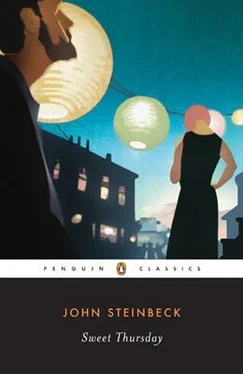John Steinbeck - Sweet Thursday
Здесь есть возможность читать онлайн «John Steinbeck - Sweet Thursday» весь текст электронной книги совершенно бесплатно (целиком полную версию без сокращений). В некоторых случаях можно слушать аудио, скачать через торрент в формате fb2 и присутствует краткое содержание. Год выпуска: 2008, ISBN: 2008, Издательство: Penguin Classics, Жанр: Классическая проза, на английском языке. Описание произведения, (предисловие) а так же отзывы посетителей доступны на портале библиотеки ЛибКат.
- Название:Sweet Thursday
- Автор:
- Издательство:Penguin Classics
- Жанр:
- Год:2008
- ISBN:1-4362-4126-X
- Рейтинг книги:5 / 5. Голосов: 1
-
Избранное:Добавить в избранное
- Отзывы:
-
Ваша оценка:
- 100
- 1
- 2
- 3
- 4
- 5
Sweet Thursday: краткое содержание, описание и аннотация
Предлагаем к чтению аннотацию, описание, краткое содержание или предисловие (зависит от того, что написал сам автор книги «Sweet Thursday»). Если вы не нашли необходимую информацию о книге — напишите в комментариях, мы постараемся отыскать её.
Cannery Row
Sweet Thursday — читать онлайн бесплатно полную книгу (весь текст) целиком
Ниже представлен текст книги, разбитый по страницам. Система сохранения места последней прочитанной страницы, позволяет с удобством читать онлайн бесплатно книгу «Sweet Thursday», без необходимости каждый раз заново искать на чём Вы остановились. Поставьте закладку, и сможете в любой момент перейти на страницу, на которой закончили чтение.
Интервал:
Закладка:
“So, you see,” said Mack, “it was music done it. You can’t trust nothing no more. You take Fauna now—the Bear Flag ain’t like any hookshop on land or sea. She makes them girls take table-manner lessons and posture lessons, and she reads the stars. You never seen nothing like it. Everything’s changed, Doc, everything.”
Doc looked around his moldy laboratory, and he shivered. “Maybe I’m changed too,” he said.
“Hell, Doc, you can’t change. Why, what could we depend on! Doc, if you change a lot of people are going to cash in their chips. Why, we was all just waiting around for you to get back so we could go on being normal.”
“I don’t feel the same, Mack. I’m restless.”
“Now you get yourself a girl,” said Mack. “You play some of the churchy music to her on your phonograph. And then I’ll come in and hustle you for a couple of bucks. Make a try, Doc. You owe it to your friends.”
“I’ll try,” said Doc, “but I have no confidence in it. I’m afraid I’ve changed.”
3
Hooptedoodle (1)
Looking back, you can usually find the moment of the birth of a new era, whereas, when it happened, it was one day hooked on to the tail of another.
There were prodigies and portents that winter and spring, but you never notice such things until afterward. On Mount Toro the snow came down as far as Pine Canyon on one side and Jamesburg on the other. A six-legged calf was born in Carmel Valley. A cloud drifting in formed the letters O-N in the sky over Monterey. Mushrooms grew out of the concrete floor of the basement of the Methodist Church. Old Mr. Roletti, at the age of ninety-three, developed senile satyriasis and had to be forcibly restrained from chasing high-school girls. The spring was cold, and the rains came late. Velella [28] Velella: Velella velella, commonly known as By-the-Wind Sailor or Purple Sail, is a jellyfish that resembles a miniature Portuguese mano’-war. Usually blue in color, these jellyfish travel by means of a small stiff sail that catches the wind. They can become stranded on beaches by the millions.
in their purple billions sailed into Monterey Bay and were cast up on the beaches, where they died. Killer whales attacked the sea lions near Seal Rocks and murdered a great number of them. Dr. Wick took a kidney stone out of Mrs. Gaston as big as your hand and shaped like a dog’s head, a beagle. The Lions’ Club announced a fifty-dollar prize for the best essay on “Football—Builder of Character.” And last, but far from least, the Sherman rose developed a carnation bud. Perhaps all this meant nothing; you never notice such things until afterward.
Monterey had changed, and so had Cannery Row and its denizens. As Mack said, “The tum-tum changes, giving place to new. And God tum-tums himself in many ways.”
Doc was changing in spite of himself, in spite of the prayers of his friends, in spite of his own knowledge. And why not? Men do change, and change comes like a little wind that ruffles the curtains at dawn, and it comes like the stealthy perfume of wildflowers hidden in the grass. Change may be announced by a small ache, so that you think you’re catching cold. Or you may feel a faint disgust for something you loved yesterday. It may even take the form of a hunger that peanuts will not satisfy. Isn’t overeating said to be one of the strongest symptoms of discontent? And isn’t discontent the lever of change?
Before the war Doc had lived a benign and pleasant life, which aroused envy in some gnat-bitten men. Doc made a living, as good a living as he needed or wanted, by collecting and preserving various marine animals and selling them to schools, colleges, and museums. He was able to turn affable and uncritical eyes on a world full of excitement. He combined the beauty of the sea with man’s loveliest achievement—music. Through his superb phonograph he could hear the angelic voice of the Sistine Choir [29] Sistine Choir: Recordings of the Vatican’s Sistine Chapel Choir.
and could wander half lost in the exquisite masses of William Byrd. [30] William Byrd: William Byrd (1540?–1623) was one of the most celebrated English composers of the Renaissance. His three famous masses (in Latin) were written between 1592 and 1595.
He believed there were two human achievements that towered above all others: the Faust [31] Faust of Goethe: German author Johann Wolfgang von Goethe’s tragedy of a man who sells his soul to Mephistopheles the devil in exchange for unlimited power. Part I was published in 1808 and revised in 1828–29; part II was published in 1832, the year Goethe died.
of Goethe and the Art of the Fugue [32] Art of the Fugue of J. S. Bach: Johann Sebastian Bach (1685 O.S.–1750 N.S.) was a prolific German composer and organist of sacred and secular works for choir, orchestra, and solo instruments. His final (and unfinished) collection of fugues and canons was composed between 1745 and 1750, and published after his death in 1750. See below pp. 80, 135, and 201.
of J. S. Bach. Doc was never bored. He was beloved and preyed on by his friends, and this contented him. For he remembered the words of Diamond Jim Brady [33] Diamond Jim Brady: James Buchanan Brady (1856–1917), American businessman, financier, and philanthropist of the Gilded Age, whose appetite for food was legendary.
who, when told that his friends were making suckers of him, remarked, “It’s fun to be a sucker—if you can afford it.” Doc could afford it. He had not the vanity which makes men try to be smart.
Doc’s natural admiration and desire for women had always been satisfied by women themselves. He had few responsibilities except to be a kindly, generous, and amused man. And these he did not find difficult. All in all, he had always been a fulfilled and contented man. A specimen so rare aroused yearning in other men, for how few men like their work, their lives—how very few men like themselves. Doc liked himself, not in an adulatory sense, but just as he would have liked anyone else. Being at ease with himself put him at ease with the world.
In the Army there had been times when he longed for his music, for his little animals, and for the peace and interest of his laboratory. Coming home, forcing open the water-swollen door, was a pleasure and a pain to him. He sighed as he looked at his bookshelves. It took him ten minutes to decide which record to play first. And then the past was gone and he was faced with the future. Old Jingleballicks had kept the little business going in a manner even more inefficient than Doc had, and then had left it to founder. The stocks of preserved animals were depleted. The business contacts had lapsed. The bank that held his mortgage was no longer checked by patriotism. There was some question whether Doc could ever build back his marginal business. In the old days he would have forgotten such considerations in multiple pleasures and interests. Now discontent nibbled at him—not painfully, but constantly.
Where does discontent start? You are warm enough, but you shiver. You are fed, yet hunger gnaws you. You have been loved, but your yearning wanders in new fields. And to prod all these there’s time, the bastard Time. The end of life is now not so terribly far away—you can see it the way you see the finish line when you come into the stretch—and your mind says, “Have I worked enough? Have I eaten enough? Have I loved enough?” All of these, of course, are the foundation of man’s greatest curse, and perhaps his greatest glory. “What has my life meant so far, and what can it mean in the time left to me?” And now we’re coming to the wicked, poisoned dart: “What have I contributed in the Great Ledger? What am I worth?” And this isn’t vanity or ambition. Men seem to be born with a debt they can never pay no matter how hard they try. It piles up ahead of them. Man owes something to man. If he ignores the debt it poisons him, and if he tries to make payments the debt only increases, and the quality of his gift is the measure of the man.
Читать дальшеИнтервал:
Закладка:
Похожие книги на «Sweet Thursday»
Представляем Вашему вниманию похожие книги на «Sweet Thursday» списком для выбора. Мы отобрали схожую по названию и смыслу литературу в надежде предоставить читателям больше вариантов отыскать новые, интересные, ещё непрочитанные произведения.
Обсуждение, отзывы о книге «Sweet Thursday» и просто собственные мнения читателей. Оставьте ваши комментарии, напишите, что Вы думаете о произведении, его смысле или главных героях. Укажите что конкретно понравилось, а что нет, и почему Вы так считаете.










